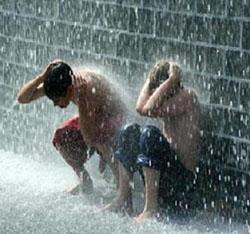General health, Nutritional, Skin care and Hair care tips for monsoons / rainy seasons
Although the monsoons or rainy season are most enjoyable, it is the main period in which health and skin diseases are most common. If one follows some simple tips during this season, he/she can enjoy the monsoons thoroughly. Read more to know the general health tips, nutritional tips, skin care tips and hair care tips for the monsoon season.

General Health Tips for the monsoons
1. If you get wet, dry yourself and drink hot tea with ginger. If you get flu like symptoms, take crocin. See a doctor if it gets worse. Dry your feet whenever they get wet.
2. Protect yourself and family with typhoid vaccines (once every 3 years) and jaundice vaccine (taken in 2 doses 6 months apart).
3. Wash your laundry clothes regularly. Sun all the umbrellas and raincoats whenever you can.
4. Keep your body warm and dry as much as possible to prevent colds and coughs.
5. Avoid wearing suede shoes. If shoes get soaked, never dry them in direct heat. Just stuff them with newspapers and keep changing the stuffing. On a sunny day, air and sun the shoes to avoid fungus formation. Regularly clean the soles of the shoes and polish leather shoes daily. Your feet are most prone to fungus infection during monsoons. So keep them always warm and dry.
6. To treat mud stains on clothes, allow the mud to dry before brushing it off. Remove the surface mud and then rub the stain with strained water in which potatoes have been boiled. If stains still remain, try a weak ammonia solution with 1/4th tsp of borax added to it.
7. As malaria is a very common disease during the rainy season, apply a strong insect repellent to keep the mosquitoes at bay and to save yourself from getting bitten. There are creams and mosquito nets also which keep the mosquitoes from biting. One can also take anti-malaria drugs during the monsoons.
8. Avoid walking over dirty water. It can not only cause leptosirosis (a rare and sever bacterial infection), but can also lead to fungal infections to your nails and skin.
9. To reduce mucous formation, mix pipli (an ayurvedic medicine) and rock salt into warm water before drinking.
10. Be careful while walking on the road as passing vehicles may splash water on you.
11. Keep yourself away from air-conditioned rooms when your hair is wet and clothes are damp.
12. Avoid standing near damp walls when you are suffering from asthma or diabetes. It can increase fungal infection which is very harmful.
13. Warm up exercises such as walking and light jogs are also needed to keep your body warm and energetic.
14. Wear loose cotton clothes and use anti-fungal talcum powder on the areas of your body which is more prone to fungal infection.
15. Take bath twice in a day to keep the fungal infections away.
16. Prevent your children from playing in the puddles.
17. Health issues such as bronchitis and arthritis increase during the monsoons due to the fall in temperature. Some of the other health problems include viral infections, dengue fever, malaria, typhoid, chikungunya, gastroenteritis, conjunctivitis, Hepatitis A, allergies, cold and cough.
18. Staying in wet clothes for too long can lead to fungal infection and can also increase the chances of viral infection.
19. If you wish to eat food from outside, opt for good quality dining options which give a lot of concern for hygienic conditions.
20.A prolonged fever could indicate the symptoms of malaria or typhoid, so consult a doctor if the fever prolongs for long time.
21. Keep your home and its surroundings always neat and never keep stagnant water at home as it is the breeding place for mosquitoes which are the carriers of major diseases like malaria.
22. Always keep antiseptic medicines like dettol at home so that you can clean off the dirt from your hands and other parts of the body. Cleaning them with dettol will prevent itching and rashes.
23. Have a regular to the best dental clinic to prevent you from any dental or oral problems.
Nutritional tips for the monsoons
1. Drink only boiled or filtered water to protect yourself from water borne diseases. Also, drink this boiled water within 24 hours of boiling.
2. Avoid salads and uncooked foods. Opt for stir-fried vegetables. It is a good idea to indulge in herbal teas during this season as they have anti-bacterial properties.
3. Don't touch dishes that have remained uncovered for example buffets.
4. Be careful about food and water - avoid street food especially cut fruits and vegetables. Even at home, wash the fruits and vegetables properly so that it is clean from dirt and bacteria. Leafy green vegetables like spinach, herbs and even cauliflowers may contain worms and larvae, so they should be cleaned with more care. During monsoons, water and raw vegetables gets polluted very easily. Boil milk properly. Drinking water should also be boiled for hygienic purposes. Steamed food is more preferable than raw food as the bacteria in the vegetables dies completely after steaming.
5. It is advisable for non-vegetarians to avoid meat, fish and spicy curries during the monsoons. Soups are extremely good during this time.
6. During the rainy season, avoid certain oils such as mustard oil, peanut oil and sesame oil. As much as possible, try to reduce eating oily foods as they are difficult to digest. Some easily digestible foods include pepper, asafoetida, cumin powder, garlic, ginger, turmeric powder and coriander powder.
7. The nutrition diet recommended for monsoons should include bitter vegetables such as bitter gourd, apple gourd, yam, snake gourd, fenugreek, cluster beans and neem. Eat light food so that the body can easily digest it but of course don't refrain yourself from food too much also. Basically, eat food in moderation.
8. Ginger or mint leaves added to hot tea is extremely good in this weather so that the body stays healthy. But stay away from too much coffee or tea also as it reduces the fluids in the body causing dehydration.
9. Reduce eating pickles and chutneys which are the main causes for water retention. They are also made to stand in room temperature for long hours in restaurants which makes them loaded with harmful bacteria. Avoid mainly coconut chutney as it has nutrients which promote the growth of bacteria.
10. If you are suffering from a bad cold or cough, treat yourself with fresh radish juice.
11. The best dal for the rainy season is moong dal as it is most easily digestible.
12. As far as possible, try to eat freshly cooked food. Avoid cooked food which has been stored in the refrigerator for a long time.
13. Among fruits too, stick to seasonal fruits as the non-seasonal ones are more prone to worm infestation during monsoons. Some of the best fruits for monsoons include bananas, mangoes, apples, cherries, pomegranates and lichees.
14. Though chaat items such as samosas and pakoras are irresistible during the monsoons, avoid eating them from roadside vendors. Instead make them at your house itself.
15. When you are at a restaurant and wish to eat soups, pasta or dal, ask the waiter to make sure that it is extremely hot when served as lukewarm items are a great place for the growth of bacteria. At the same time, frozen foods such as ice cream must be fully frozen when served. 
Skin care tips for the monsoons
1. Always apply a sunscreen when you step out of the house, even if it is a cloudy day.
2. During the monsoons, it is always advisable to avoid heavy make-up.
3. Always keep your skin clean so that it is free from fungal infections. Cleansing the face often daily is a good idea.
4. After cleansing, it would be good for your skin to use a toner which will close all the pores and restore the skin's smoothness. It also prevents blackheads and other infections if the toner contains an anti-bacterial property.
5. After cleansing and toning, the last step is to moisturise the face which is great to rehydrate the skin.
Hair care tips for the monsoons
1. Eat a balanced diet which is also rich in Vitamin E which helps to give strong and healthy hair.
2. Do not use a hairbrush on frizzy hair. It can cause split ends to your hair.
3. Shampoo your hair thoroughly to keep the scalp clean. Always follow it with an application of conditioner which helps to soften the hair and makes the frizz manageable. Apply conditioner only to your hair. Do not let it touch the scalp.
4. Dry frizzy hair naturally, instead of using a towel or blow dryer. Excess application of styling products can make the hair greasy and dull due to the increased humidity levels. Avoid styling your hair such as hair colouring and perming as these treatments will not give the best results during this season.
5. For daily care, apply a leave-in cream on dry or wet, towel-dried hair. Take one to three nut-sized drops. Spread it across the length of your hair and smooth.
6. The nourishing and relaxing properties of walnut oil and the soothing properties of peach leaf are ideal to control frizzy hair during the monsoon season.
7. Never tie up wet or damp hair as it promotes fungal infections.
8. It is better to keep your hair short during this season as it is easier to keep the scalp clean and dry.
9. Painful pus-filled boils are very common on the scalp during the monsoons because of the fungal infections. To cure these boils, apply Betadine AD shampoo twice a week.
10. Dandruff and lice infestation is also highly common during the rainy season. Try ketoconazole-based shampoos to get rid of the dandruff. For a home remedy, you can massage the scalp with curds or refined oil before washing the hair. Warm coconut oil is also great to get rid of dandruff and for healthy, long hair. Use an anti-dandruff shampoo.
11. For getting rid of the lice, you can try applying Perlice which you have to leave on for few hours and then wash it off. Neem oil is also good to get rid of lice and itchy scalp. You can consult a dermatologist if the problem persists.

 Job oriented
Job oriented
It is a very good topic. Thanks for sharing these ideas. By regular exercise you can maintain your health in almost all seasons.